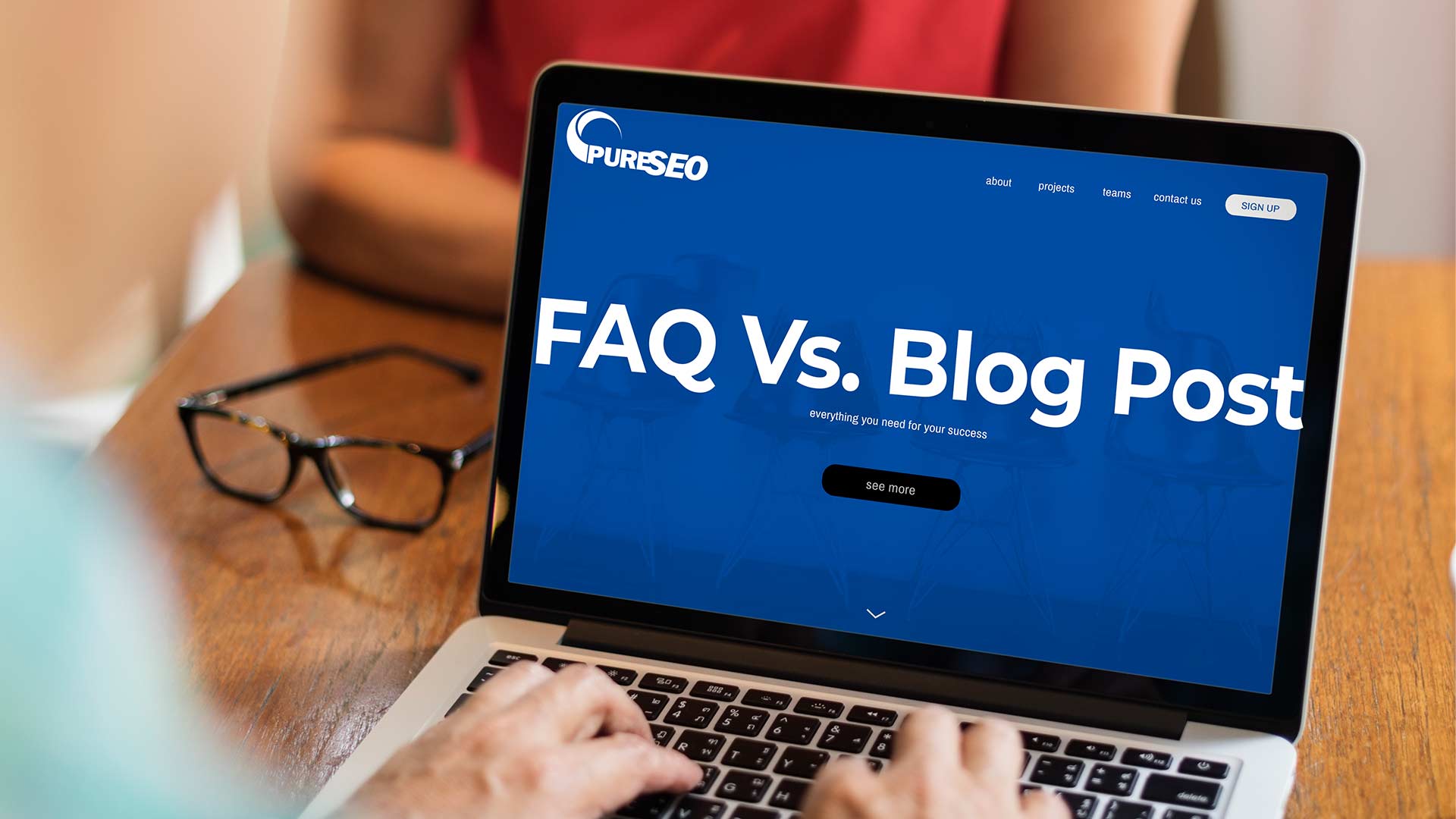The Pure SEO Team
The editorial team at Pure SEO is super proud of our content. Follow our official channels on social media.

FAQ and blog posts are convenient ways to talk to your customers and clients about your products or services without wasting their time (or yours!). It doesn’t have to be an either/or; great websites will have a detailed FAQ page and dedicated blog content.
Although both pages end up providing similar services, the way they go about it is functionally very different. Either way, both are crucial to a great content marketing strategy.
Let’s explore the key differences between FAQ pages and blog posts and how to use both to your advantage.
The key difference between blog posts and FAQs is a question of depth. The experience users expect when clicking an FAQ page differs from the one they hope to find from well-honed blog content.
FAQs answer specific questions. They’re short, sharp, and straight to the point. FAQ pages should be a one-stop shop that answers several customer questions, from product information to shipping and services. They’re for the customers that want information they can use.
Blog posts, on the other hand, wander deeper into various subjects. They can answer questions but also give tips and tricks and highlight subjects that aren’t directly related to your products or services. They’re more of an engagement tool that helps to build brand trust and awareness through content. They also offer backlinking opportunities, as third-party sites can share links to your blog content on their websites and social media feeds!
To make good content marketing great, it should incorporate a mix of components. FAQ pages and blog posts work together to improve SEO in several ways, some the same and some different. Let’s look at how you can use blog posts and FAQs as a power couple to jump-start your SEO success.
FAQs and blog posts are great ways to improve your internal linking, which is crucial to good SEO. A solid catalogue of backlinks to a page informs search engines that your site pages are not only trustworthy but relevant. Think about all the different keywords you can use to take customers around your site as you inform and entertain!
Choose relevant keywords for key conversion pages on your site and link away! It’s a great way to incorporate opportunities for conversions and hook them in at a crucial point of their customer journey.
Inserting keywords isn’t always just for backlinking. Smart deployment of keywords can increase organic reach as search engines trawl your site for relevant phrases to serve customer queries.
Remember, search engines aim to give searchers the most relevant pages with a great user experience. Placing keywords in your copy on both FAQ pages and blog content can contextualise your product and attract more eyeballs without them paying the digital advertising piper!
Blog content is a great way to add value to your site. Your products and services never stand alone; they operate within a wider industry that blog posts can capitalise upon to capture information-hungry audiences. Blog posts are conversations. They offer the chance to build on information an FAQ doesn’t cover. A good post can give tips, tricks, and helpful ideas to add value to your site—and your product!
Both FAQs and blog content can work to build customer trust. A detailed FAQ can quell customers’ queries, while blogs show you know what you’re talking about in your industry. Both pages are also great ways to show the customer that you care. You care about their experiences and your business enough to put in just a little more effort!
There are FAQ pages, and then there are great FAQ pages! Here are a few tips for creating an awesome FAQ page.
Gathering customer data should serve a purpose. There’s no point knowing Mary’s age, sex, and dietary requirements if you’re not going to utilise it for great content. Examine your customer data, what questions they email through, and how they buy. It’ll help you to know what they want and need.
Make it clear what you’re answering. Categories are a great way to send customers directly to where they want to go, which makes for a great user experience.
Ensure you have at least one or two clear CTA opportunities for your customers. Link to product pages or shipping routes and tell them where and what to do! It’s a sure-fire way to convert!
Customers love to know what other people think. Consumers are savvy and can see through a marketing ploy or two. Incorporating short, sharp customer reviews is a great way to build trust and conversions.
If you need help making you your FAQs and blog posts harmonise to perfect your SEO content strategy, the Pure SEO team can help. We’re experts in digital marketing and love to create content marketing that sings for SEO! For all your linking, keywords, and copy creation, we have a full team of content creators and SEO professionals to work on your site, driving clicks, conversions, and ranking!
Get in touch with Pure SEO today and get your content strategy on track to rank with the best.

